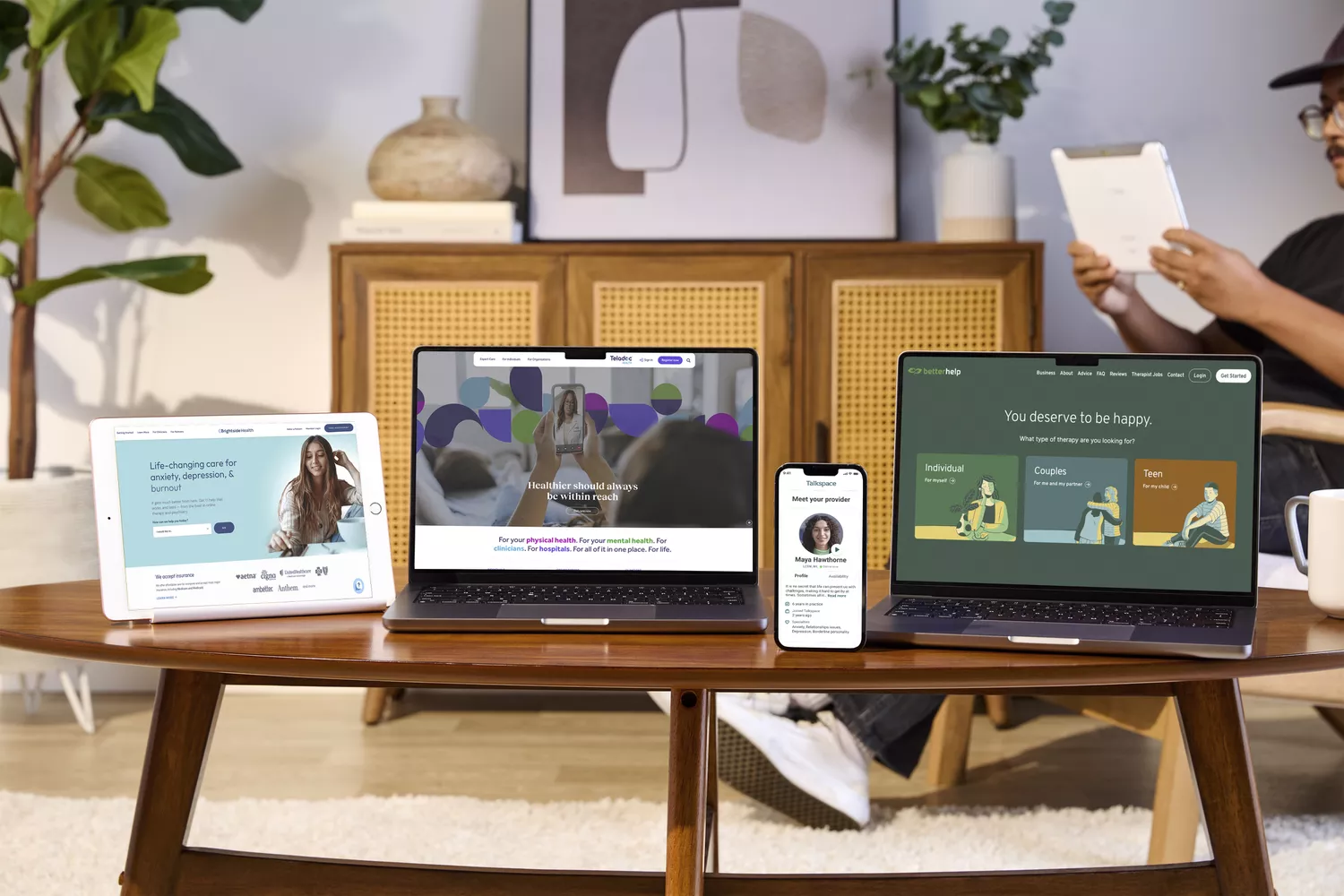Life in 2025 can feel relentlessly demanding. The constant juggle of work, family, and personal well-being often leaves us feeling overwhelmed, anxious, or profoundly lonely. Many struggle in silence, yearning for support but finding traditional therapy inaccessible, expensive, or simply inconvenient. The idea of carving out time for in-person appointments, battling traffic, or navigating complex insurance paperwork can be a significant barrier to seeking the help you deserve.
This isn't just about feeling 'a bit down'; it's about the real, pervasive challenges that impact millions. From persistent anxiety that clouds every decision to the silent weight of depression, or the strain on relationships, these issues demand attention. Yet, finding the right support can feel like searching for a needle in a haystack, especially when you've been grappling with these feelings for years—out of touch with effective solutions.
The Evolving Landscape of Mental Health Support
The demand for accessible mental health care has skyrocketed, particularly in the wake of global changes. In 2025, digital solutions are no longer a niche alternative but a mainstream pathway to well-being. This shift is driven by the undeniable convenience and privacy that online therapy offers, allowing individuals to connect with licensed professionals from the sanctuary of their own homes.
However, the sheer volume of platforms can be daunting. Not all services are created equal, and discerning the truly effective from the merely adequate requires careful scrutiny. Our mission is to cut through the noise, providing clarity on which online therapy services genuinely deliver value and support.
Why Traditional Therapy Often Falls Short
While traditional in-person therapy holds undeniable benefits, its limitations can be significant barriers for many. Geographic constraints mean that quality therapists might be scarce in rural areas, or specialists for specific conditions might be hours away. The cost of sessions without robust insurance coverage can be prohibitive, often exceeding $200 per hour. Furthermore, the stigma associated with mental health care can make the act of physically attending an appointment feel exposing, deterring individuals from seeking help.
Scheduling conflicts with work, childcare, or other responsibilities also pose a major hurdle. For many, the time commitment involved in travel and waiting room delays simply makes consistent, in-person therapy unsustainable. These factors collectively push individuals away from the consistent support they need, creating a gap that digital solutions are uniquely positioned to fill.
Understanding the Power of Online Therapy
Online therapy, or teletherapy, leverages technology to connect clients with mental health professionals remotely. This can occur through video calls, phone conversations, or even text-based messaging. Its core appeal lies in its flexibility and often, its affordability compared to traditional in-person sessions.
What to Expect from Online Therapy:
- Cost: Session prices typically range from $55 to over $200, depending on the service and session type. Many platforms offer subscription models for better value.
- Who Benefits: It's ideal for individuals managing mild to moderate mental health conditions, seeking personal growth, or navigating life challenges. It is not suitable for severe mental illness, crisis intervention, or suicidal ideation; these situations require immediate, in-person professional help.
- Insurance Coverage: Many platforms accept insurance, though coverage varies. Always verify your plan directly with the provider or platform before committing.
- Confidentiality: Reputable services are HIPAA-compliant, safeguarding your personal health information. Always review a company's privacy policy to understand data handling practices and opt out of third-party data collection where possible.
- Session Formats: Options include video chat, phone calls, and secure messaging, with sessions lasting from 30 minutes to an hour or more.
- Effectiveness: The success of online therapy hinges on your commitment, the therapist's skill, and the rapport you build. Don't hesitate to switch therapists if the initial match isn't right; finding a strong connection is paramount to effective treatment. Research from institutions like Stanford (2024) consistently supports the efficacy of online therapy for a wide range of conditions, often comparable to in-person care.
Our Rigorous Approach to Evaluating Online Therapy Platforms
At Routinova, our commitment to providing trustworthy recommendations is unwavering. For years—out of exhaustive evaluation, we've delved deep into the world of online therapy. Our process involved:
- Firsthand Experience: We commissioned 65 diverse individuals to sign up for talk therapy across 55 different online companies. Each tester engaged with services for at least a month (2-6 sessions), often switching therapists to gauge the breadth of offerings and quality. This extensive, real-world testing spanned various locations across the United States and internationally, providing a rich tapestry of user insights.
- Comprehensive User Surveys: We collected feedback from over 8,000 current and recent therapy clients from the 55 tested companies and 27 therapy directories. This survey captured 350 distinct data points, evaluating everything from therapist qualifications and needs fulfillment to overall satisfaction.
This meticulous, multi-faceted approach ensures our recommendations are grounded in genuine experience and broad user sentiment, offering a reliable guide to the best online therapy years—out there.
Top-Rated Online Therapy Services for Comprehensive Care
Based on our extensive evaluation, these 10 online therapy services stand out for their quality, accessibility, and effectiveness.
Most Holistic Support: Talkspace
Out-of-Pocket Costs: $69-$109/week for therapy (monthly subscription); Psychiatry: $299 initial, $175 follow-ups (bundles available).
- Insurance & Essential Info: Accepts many insurance plans (verify coverage). Services include individual, couples, teen therapy, and psychiatry/medication management. Session types: video, phone, messaging.
- Pros: Broad insurance acceptance, diverse treatment options (including psychiatry), asynchronous messaging, flexible session formats.
- Cons: Cheapest plan is text-only (not recommended for comprehensive care), video sessions are typically 30 minutes, therapist quality can vary.
Why it Stands Out: Talkspace impresses as a one-stop digital mental health hub. Its integration of therapy, psychiatry, and various communication methods, all often covered by insurance, offers unparalleled convenience. Our testers consistently reported professional, warm, and accommodating therapists. One tester noted their therapist's proactive holiday message, offering support outside of session, highlighting the personalized care available.
Considerations: While the text-only plan is affordable, we advise caution. Visual and auditory cues are vital in therapy, and text-only can hinder deeper connection. Session lengths of 30 minutes can also feel rushed. Like any large platform, finding the right therapist might require switching, which Talkspace makes easy.
Unmatched Accessibility: BetterHelp
Out-of-Pocket Costs: $70-$100/week (monthly subscription).
- Insurance & Essential Info:Does not accept insurance. Services: individual therapy. Session types: video, phone, messaging.
- Pros: Global availability (all 50 states, 200 countries), extensive scheduling options (evenings/weekends), easy rescheduling, multiple communication channels.
- Cons: Pricing varies by location/therapist, no insurance acceptance, inconsistent quality of care.
Why it Stands Out: BetterHelp is the champion of widespread access. Our testers, including one in the UK and others in therapy-scarce regions like Kansas and Missouri, consistently found convenient and consistent appointments. While some experiences were described as "therapy light," the sheer availability makes it a lifeline for many. A Routinova user in a remote area found BetterHelp to be the only viable option for consistent support over several months.
Considerations: The lack of insurance acceptance is a significant drawback. Quality can also be a lottery; some testers reported issues like missed appointments or insensitive remarks. Pricing variability based on location is also unique and can be a surprise for new users.
Specialized for Mood Disorders: Brightside
Out-of-Pocket Costs: $95-$349/month (monthly subscription).
- Insurance & Essential Info: Accepts a wide range of insurance plans (verify coverage). Services: individual therapy, teen therapy, psychiatry/medication management. Session types: video, unlimited messaging.
- Pros:Specializes in anxiety and depression, integrates psychiatry, broad insurance acceptance, multiple subscription tiers.
- Cons: Insurance coverage varies by location, intake can feel impersonal, no per-session payment option.
Why it Stands Out: Brightside excels by focusing its expertise specifically on anxiety and depression. Our five testers reported highly effective treatment, with one noting a significant reduction in panic attacks and reliance on medication after just a few sessions. The platform's emphasis on CBT homework and prompt, personal therapist replies between sessions provides crucial support for those managing mood disorders. A Routinova tester appreciated the homework that helped her practice CBT techniques, leading to tangible improvements.
Considerations: While effective, finding the right therapist can still involve trial and error, and initial intake experiences can sometimes feel less personal. A recent tester, unfortunately, struggled to find a suitable therapist for her depression even after switching, highlighting that individual fit remains key.
Cognitive Behavioral Therapy Focus: Online-Therapy.com
Out-of-Pocket Costs: $60-$120/week (monthly subscription).
- Insurance & Essential Info:Does not accept insurance. Services: individual therapy, couples therapy. Session types: video, phone, messaging.
- Pros:All therapists specialize in CBT, extensive CBT resource library, offers both individual and couples therapy, unlimited messaging.
- Cons: No insurance acceptance, inability to choose your own therapist initially.
Why it Stands Out: For those seeking a structured, action-oriented approach, Online-Therapy.com is a standout. It's a CBT powerhouse, offering not just expert therapists but a comprehensive toolkit of worksheets, mood trackers, and educational videos. Our eight testers were consistently impressed by the professionalism and knowledge of their therapists, who effectively integrated CBT principles and assigned valuable "homework" with personalized feedback. They appreciated building quick rapport with warm, supportive providers.
Considerations: The exclusive focus on CBT might not suit everyone; one tester found the homework overwhelming. The inability to choose a therapist initially could also be a minor hurdle, though switching is possible if the first match isn't ideal.
Best for Insurance Integration: Thriveworks
Out-of-Pocket Costs: Therapy: $200-$240 initial, $160-$195 follow-up; Psychiatry: $255-$375 initial, $175-$300 follow-up.
- Insurance & Essential Info: In-network with over 360 insurance plans (verify coverage). Services: individual, couples, teen, child, family therapy, psychiatry/medication management. Session types: video, phone, in-person (340 locations).
- Pros: Unrivaled insurance acceptance, broad range of therapy types for all ages, in-person options, longer 50-60 minute sessions.
- Cons: Fewer therapists for highly niche services, no messaging between sessions.
Why it Stands Out: Thriveworks is a game-changer for individuals struggling to find a therapist who accepts their insurance. Being in-network with more than 360 plans makes quality mental health care accessible to a vast population. Our eight testers, spanning various states and seeking diverse services, largely reported exceptional care from knowledgeable, caring, and attentive therapists. One tester in South Dakota praised her therapist's thorough yet gentle approach, making it easy to open up.
Considerations: While comprehensive, availability for very specific needs (e.g., EMDR in a particular region) might be limited. Some testers encountered issues like cancelled sessions or therapists offering cliched advice, underscoring the importance of utilizing their excellent customer service for therapist switches.
Budget-Friendly Excellence: E-Therapy Cafe
Out-of-Pocket Costs: $55 first session, $65 subsequent (bundles available for lower rates).
- Insurance & Essential Info:Does not accept insurance. Services: individual therapy, couples therapy, coaching. Session types: video, phone, messaging.
- Pros: Highly affordable out-of-pocket pricing, transparent pricing, coaching available nationwide, same price for individual and couples therapy.
- Cons: No insurance acceptance, therapy services limited by state licensure, limited therapist diversity.
Why it Stands Out: E-Therapy Cafe shines as the most affordable option without compromising quality. Its clear, low pricing—starting at $55 for the first session—makes it an invaluable resource for the uninsured or underinsured. Our seven testers consistently praised the knowledgeable, compassionate support from their therapists, whether for individual or couples sessions (which cost the same). The small, expert team of 13 clinicians, all licensed therapists and life coaches, provides a personalized feel with broad reach.
Considerations: The primary limitation is that therapy services are state-restricted, though coaching can be provided nationwide. While effective, greater diversity among providers would be beneficial.
Dedicated to Relationships: Regain
Out-of-Pocket Costs: $70-$100/week (monthly subscription).
- Insurance & Essential Info:Does not accept insurance. Services: couples therapy, individual relationship counseling. Session types: video, phone, messaging.
- Pros: Exclusive focus on relationships, supports partners joining from different locations, offers both couples and individual relationship counseling.
- Cons: Short session times (30-45 mins), no insurance acceptance, significant variability in therapist quality.
Why it Stands Out: Regain is specifically designed for relationship-focused support, whether you're seeking joint couples therapy or individual counseling to address relationship dynamics. Its wide availability, mirroring its parent company BetterHelp, ensures access even in mental health deserts. When positive, our seven testers' experiences were highly impactful, with knowledgeable therapists providing useful feedback and supporting communication practice between sessions. One couple praised their therapist's adaptability in navigating parenting issues.
Considerations: Session lengths are often too short for two people to fully engage. Testers reported a wide range in therapist quality, including instances of biased assumptions or a lack of engagement, leading to frustrating experiences. The absence of insurance acceptance is also a notable downside.
Superior Scheduling Flexibility: Teladoc
Out-of-Pocket Costs: Therapy: $119/session; Psychiatry: $299 initial, $129 follow-up.
- Insurance & Essential Info: Accepts insurance (check after signup). Services: individual therapy, teen therapy, psychiatry/medication management. Session types: video, phone.
- Pros:Extensive scheduling availability (7 am-9 pm, 7 days/week), accepts insurance, ability to choose therapist from curated list, diverse service offerings.
- Cons: Insurance verification and provider bios require signup, lack of transparency before commitment.
Why it Stands Out: Teladoc excels in scheduling convenience, making it incredibly easy to integrate therapy into a busy lifestyle. With appointments available virtually any time, any day, our six testers found balancing therapy with work and home life remarkably stress-free. They consistently lauded their therapists as professional and empathetic, offering both practical solutions and deep dives into personal issues. One busy mother of four appreciated being able to schedule sessions before her husband started work, highlighting true flexibility.
Considerations: A minor drawback is the requirement to sign up before checking insurance compatibility or viewing therapist profiles, which could be a barrier for some initially.
Family-Wide Mental Health: Doctor on Demand
Out-of-Pocket Costs: Therapy: $134-$184/session; Psychiatry: $299 initial, $129 follow-up.
- Insurance & Essential Info: Accepts insurance (verify coverage). Services: individual, couples, teen, child therapy, psychiatry/medication management. Session types: video.
- Pros:Comprehensive care for ages 1 and up (therapy and psychiatry), ability to choose provider, accepts insurance, transparent insurance verification.
- Cons: Out-of-pocket costs can be high, potential for parent/guardian presence in minors' sessions.
Why it Stands Out: For families seeking integrated mental health care, Doctor on Demand is a robust solution. It uniquely offers therapy and psychiatry for children as young as one, through teens and adults. Our four testers, including a teenager seeking psychiatry and an adult addressing family dynamics, reported highly positive experiences. The teen's psychiatrist thoroughly understood his family history, building confidence in his treatment plan. Other testers appreciated the blend of insights and practical solutions, feeling their sessions were like talking to a knowledgeable friend.
Considerations: While highly comprehensive, the out-of-pocket prices can be a deterrent for those without insurance. The requirement for a parent/guardian to be present in minors' sessions (as experienced by one tester) might also be a factor for some families.
Premier for Psychiatric Care: Talkiatry
Out-of-Pocket Costs: Varies based on copay (no self-pay option).
- Insurance & Essential Info: Accepts insurance (verify coverage before signup). Services: psychiatry/medication management, individual therapy, teen therapy, child therapy. Session types: video.
- Pros:Accepts insurance for psychiatry, treats ages 5 and up, prescribes controlled substances, longer session durations (1-hour intake, 30-min follow-ups), transparent insurance check.
- Cons: No self-pay options, therapy only available via psychiatrist referral.
Why it Stands Out: Talkiatry sets a new standard for online psychiatry. It stands apart by treating ages five and up, prescribing controlled substances, and crucially, accepting insurance—a rarity in psychiatric care. Its extended session lengths (a full hour for intake, 30 minutes for follow-ups) allow for thorough evaluations and a more therapeutic approach than typical brief medication checks. Our two testers praised the depth and comprehensiveness of their sessions, feeling confident in their treatment plans. A Routinova user noted her follow-up sessions felt more like therapy, allowing her to discuss broader life issues.
Considerations: The service is exclusively insurance-based, meaning no options for uninsured individuals. Therapy services are also restricted to referrals from Talkiatry psychiatrists, limiting direct access for some.
Alternative Digital Mental Health Solutions
Beyond the leading platforms, several other services offer unique benefits for specific needs.
- Headspace: Known for its mindfulness app, Headspace expanded into online therapy in mid-2025. It aims for accessibility with services nationwide, accepting 45 insurance plans, and a flat $149 out-of-pocket fee. Therapy clients receive a free three-month app subscription, making it an intriguing option for integrated mental wellness.
- Sesame: This platform focuses on affordable, quick healthcare, including mental health, for the uninsured or those with high-deductible plans. Therapists and psychiatrists are independent clinicians offering direct, low out-of-pocket rates (rivaling copays), and you can choose providers by specialty, price, and availability. Messaging between sessions with guaranteed 24-hour responses enhances its appeal for budget-conscious users.
- Rula: Rula emphasizes diversity and proactive clinical oversight, with 49% non-white clinicians, 11 genders, and over 40 languages spoken across its 18,000 providers. It offers individual, couples, and family therapy (ages 5+) and medication management (ages 13+). Rula is in-network with most major US insurers, including Medicaid and Medicare, and boasts rigorous HIPAA-compliant privacy practices. It's an excellent choice for those seeking an affirming, insurance-friendly service with diverse provider options.
Finding Your Ideal Online Therapist: A Step-by-Step Guide
The cornerstone of effective therapy is the therapeutic rapport you build with your provider. This trust allows for honest, open communication without fear of judgment. A skilled therapist practices unconditional positive regard, supporting you regardless of your thoughts or actions (provided they don't harm yourself or others).
Steps to Find Your Match:
- Define Your Needs: What issues do you want to address? Do you prefer a specific therapeutic approach (e.g., CBT, psychodynamic)? Consider therapist demographics (gender, cultural background) if important to you.
- Research Platforms: Use guides like this one to identify platforms that align with your budget, insurance, and service needs (e.g., individual, couples, psychiatry).
- Initial Consultations: Many platforms offer brief consultations or make it easy to switch therapists. Use these opportunities to gauge comfort and connection.
- Evaluate Rapport: After a few sessions, honestly assess if you feel heard, understood, and comfortable opening up. If not, it's perfectly acceptable—and even encouraged—to seek a new therapist. Online platforms typically streamline this process, increasing your chances of finding the right fit.
Navigating Costs: Insurance, Subscriptions, and Self-Pay
One of online therapy's greatest advantages is its flexibility in payment options, addressing a common barrier to traditional care.
Utilizing Insurance: Unlike many in-person practices, numerous online therapy companies are in-network with a wide array of insurance plans. Services like Talkspace, Brightside, Thriveworks, Teladoc, Doctor on Demand, and Talkiatry are excellent starting points. Many allow you to verify coverage before committing, saving you time and financial stress.
Subscription Models: For those without insurance or seeking predictable costs, subscription services are highly beneficial. Platforms like BetterHelp, Talkspace, Brightside, and Online-Therapy.com offer monthly fees that often provide a set number of sessions, making therapy more affordable than traditional out-of-pocket rates (often significantly less than $200 per session). This model provides consistent access to care without unexpected bills.
Direct Self-Pay: Even for individual sessions, online platforms often present more competitive pricing. No company on our list charges more than $200 per therapy session, with many costing significantly less. E-Therapy Cafe, for instance, offers exceptionally low pay-per-session rates, making it a prime choice for affordable non-subscription self-pay.
Ensuring Your Privacy in Online Sessions
Privacy is a paramount concern when engaging with online mental health services. As technology advances, so do the safeguards, but vigilance remains crucial.
HIPAA Compliance: The absolute minimum standard for any reputable online therapy provider is HIPAA compliance. This federal law dictates how your protected health information (PHI) is handled. Always confirm a company's HIPAA compliance, typically stated in their privacy policy or on their website. However, HIPAA still allows for various data sharing under specific conditions.
Beyond HIPAA: The early 2020s saw some online therapy giants face scrutiny and even lawsuits over questionable privacy practices, such as sharing client data with advertisers. Since then, the industry has largely improved, with greater transparency regarding data collection and sharing. Many platforms now offer options to opt out of certain data collection. However, it's important to remember that any digital information carries inherent, albeit minimal, risks of data breaches.
Your Action Plan:
- Read the Privacy Policy: Thoroughly review the policy before signing up.
- Confirm HIPAA Compliance: Ensure it's explicitly stated.
- Opt-Out: Actively look for and utilize options to opt out of non-essential data collection or sharing.
Frequently Asked Questions About Online Therapy
Q: How effective is online therapy compared to in-person sessions?
A: Research, including studies from institutions like Harvard (2024), consistently indicates that online therapy can be as effective as in-person therapy for a wide range of mental health conditions, particularly for mild to moderate issues. Key factors for success include therapist-client rapport and client engagement.
Q: Can online therapists prescribe medication?
A: Yes, many online platforms offer psychiatry services where licensed psychiatrists or psychiatric nurse practitioners can evaluate, diagnose, and prescribe medication, including controlled substances where appropriate and legal. Talkiatry is a prime example of a service excelling in this area.
Q: What if I don't connect with my first online therapist?
A: It's completely normal and encouraged to switch therapists if the initial match isn't right. Most online therapy platforms make this process very easy and straightforward, understanding that finding the right fit is crucial for successful therapy.
Q: Is online therapy truly confidential?
A: Reputable online therapy services are HIPAA-compliant, meaning they adhere to federal standards for protecting your health information. However, as with any digital service, it's vital to review their specific privacy policies and opt out of any non-essential data sharing to ensure maximum privacy.
Q: Is online therapy suitable for severe mental health crises?
A: No, online therapy is generally not recommended for severe mental health crises, suicidal ideation, or serious mental illness requiring immediate, intensive care. In such situations, it's crucial to seek emergency services or in-person professional help immediately. Services like Brightside clearly state this limitation.










